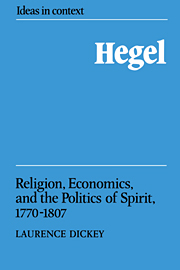Book contents
- Frontmatter
- Contents
- Preface
- Acknowledgments
- Introduction: Hegel in a Protestant cultural context
- Part I Hegel's Württemberg: “Civil Millenarianism” and the two faces of Protestant civil piety
- 1 The religious culture of Old-Württemberg: I. Christian eschatology and “down-to-earth” Pietism
- 2 The religious culture of Old-Württemberg: II. J. A. Bengel and the theology of the divine economy
- 3 The political culture of Old-Württemberg: The Alte Recht tradition
- Part II Württemberg's Hegel: Applied theology and social analysis
- Part III Toward the Phenomenology: Sittlichkeit becomes a problem in social and political theory
- Epilogue: Bildung and politics: The “first class,” Christian pride, and “absolute spirit”
- Abbreviations
- Notes
- Index
2 - The religious culture of Old-Württemberg: II. J. A. Bengel and the theology of the divine economy
Published online by Cambridge University Press: 11 January 2010
- Frontmatter
- Contents
- Preface
- Acknowledgments
- Introduction: Hegel in a Protestant cultural context
- Part I Hegel's Württemberg: “Civil Millenarianism” and the two faces of Protestant civil piety
- 1 The religious culture of Old-Württemberg: I. Christian eschatology and “down-to-earth” Pietism
- 2 The religious culture of Old-Württemberg: II. J. A. Bengel and the theology of the divine economy
- 3 The political culture of Old-Württemberg: The Alte Recht tradition
- Part II Württemberg's Hegel: Applied theology and social analysis
- Part III Toward the Phenomenology: Sittlichkeit becomes a problem in social and political theory
- Epilogue: Bildung and politics: The “first class,” Christian pride, and “absolute spirit”
- Abbreviations
- Notes
- Index
Summary
The historical coherence of much of what was stated in the last chapter can be illustrated by the career and thought of J. A. Bengel (1687–1752). At the same time, elaboration of Bengel's religious views, especially those that relate to what we shall call his theology of the divine economy, is indispensable to understanding the way in which religious and political conceptions dovetailed in the culture of Old-Württemberg in the eighteenth century. That means, of course, that this chapter is transitional in that it uses the focus on Bengel to connect the ethicoeschatological argument of Chapter 1 with the political narrative of Chapter 3.
Bengel: The eschatological mood
The date of Bengel's birth – June 24, 1687 – fell within a year of two significant events in the annals of Old-Württemberg: the beginning of the War of the League of Augsburg in 1688 and the Württemberg Consistory's issuance in the same year of the Instruction wegen des Ordinis Studiorum (henceforth Instruction). Bengel was, in both his personal and his professional outlook, very much a product of both events. In the first case, Louis XIV's decision to press his claim for French possession of the Rhine Palatinate led not only to its destruction but eventually to the devastation of Württemberg as well. Indeed, Jan. 2, 1689, saw a French army under General Melac standing before Stuttgart, menacing the capital city as well as the rest of the land with its incendiary military tactics.
- Type
- Chapter
- Information
- HegelReligion, Economics, and the Politics of Spirit, 1770–1807, pp. 77 - 112Publisher: Cambridge University PressPrint publication year: 1987

